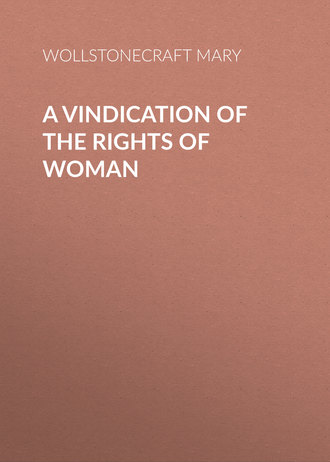 полная версия
полная версияA Vindication of the Rights of Woman
But, if strength of body be, with some show of reason, the boast of men, why are women so infatuated as to be proud of a defect? Rousseau has furnished them with a plausible excuse, which could only have occurred to a man, whose imagination had been allowed to run wild, and refine on the impressions made by exquisite senses, that they might, forsooth have a pretext for yielding to a natural appetite without violating a romantic species of modesty, which gratifies the pride and libertinism of man.
Women deluded by these sentiments, sometimes boast of their weakness, cunningly obtaining power by playing on the WEAKNESS of men; and they may well glory in their illicit sway, for, like Turkish bashaws, they have more real power than their masters: but virtue is sacrificed to temporary gratifications, and the respectability of life to the triumph of an hour.
Women, as well as despots, have now, perhaps, more power than they would have, if the world, divided and subdivided into kingdoms and families, was governed by laws deduced from the exercise of reason; but in obtaining it, to carry on the comparison, their character is degraded, and licentiousness spread through the whole aggregate of society. The many become pedestal to the few. I, therefore will venture to assert, that till women are more rationally educated, the progress of human virtue and improvement in knowledge must receive continual checks. And if it be granted, that woman was not created merely to gratify the appetite of man, nor to be the upper servant, who provides his meals and takes care of his linen, it must follow, that the first care of those mothers or fathers, who really attend to the education of females, should be, if not to strengthen the body, at least, not to destroy the constitution by mistaken notions of beauty and female excellence; nor should girls ever be allowed to imbibe the pernicious notion that a defect can, by any chemical process of reasoning become an excellence. In this respect, I am happy to find, that the author of one of the most instructive books, that our country has produced for children, coincides with me in opinion; I shall quote his pertinent remarks to give the force of his respectable authority to reason.*
But should it be proved that woman is naturally weaker than man, from whence does it follow that it is natural for her to labour to become still weaker than nature intended her to be? Arguments of this cast are an insult to common sense, and savour of passion. The DIVINE RIGHT of husbands, like the divine right of kings, may, it is to be hoped, in this enlightened age, be contested without danger, and though conviction may not silence many boisterous disputants, yet, when any prevailing prejudice is attacked, the wise will consider, and leave the narrow-minded to rail with thoughtless vehemence at innovation.
The mother, who wishes to give true dignity of character to her daughter, must, regardless of the sneers of ignorance, proceed on a plan diametrically opposite to that which Rousseau has recommended with all the deluding charms of eloquence and philosophical sophistry: for his eloquence renders absurdities plausible, and his dogmatic conclusions puzzle, without convincing those who have not ability to refute them.
Throughout the whole animal kingdom every young creature requires almost continual exercise, and the infancy of children, conformable to this intimation, should be passed in harmless gambols, that exercise the feet and hands, without requiring very minute direction from the head, or the constant attention of a nurse. In fact, the care necessary for self-preservation is the first natural exercise of the understanding, as little inventions to amuse the present moment unfold the imagination. But these wise designs of nature are counteracted by mistaken fondness or blind zeal. The child is not left a moment to its own direction, particularly a girl, and thus rendered dependent—dependence is called natural.
To preserve personal beauty, woman's glory! the limbs and faculties are cramped with worse than Chinese bands, and the sedentary life which they are condemned to live, whilst boys frolic in the open air, weakens the muscles and relaxes the nerves. As for Rousseau's remarks, which have since been echoed by several writers, that they have naturally, that is from their birth, independent of education, a fondness for dolls, dressing, and talking, they are so puerile as not to merit a serious refutation. That a girl, condemned to sit for hours together listening to the idle chat of weak nurses or to attend at her mother's toilet, will endeavour to join the conversation, is, indeed very natural; and that she will imitate her mother or aunts, and amuse herself by adorning her lifeless doll, as they do in dressing her, poor innocent babe! is undoubtedly a most natural consequence. For men of the greatest abilities have seldom had sufficient strength to rise above the surrounding atmosphere; and, if the page of genius has always been blurred by the prejudices of the age, some allowance should be made for a sex, who, like kings, always see things through a false medium.
In this manner may the fondness for dress, conspicuous in women, be easily accounted for, without supposing it the result of a desire to please the sex on which they are dependent. The absurdity, in short, of supposing that a girl is naturally a coquette, and that a desire connected with the impulse of nature to propagate the species, should appear even before an improper education has, by heating the imagination, called it forth prematurely, is so unphilosophical, that such a sagacious observer as Rousseau would not have adopted it, if he had not been accustomed to make reason give way to his desire of singularity, and truth to a favourite paradox.
Yet thus to give a sex to mind was not very consistent with the principles of a man who argued so warmly, and so well, for the immortality of the soul. But what a weak barrier is truth when it stands in the way of an hypothesis! Rousseau respected—almost adored virtue—and yet allowed himself to love with sensual fondness. His imagination constantly prepared inflammable fuel for his inflammable senses; but, in order to reconcile his respect for self-denial, fortitude and those heroic virtues, which a mind like his could not coolly admire, he labours to invert the law of nature, and broaches a doctrine pregnant with mischief, and derogatory to the character of supreme wisdom.
His ridiculous stories, which tend to prove that girls are NATURALLY attentive to their persons, without laying any stress on daily example, are below contempt. And that a little miss should have such a correct taste as to neglect the pleasing amusement of making O's, merely because she perceived that it was an ungraceful attitude, should be selected with the anecdotes of the learned pig.*
I have, probably, had an opportunity of observing more girls in their infancy than J. J. Rousseau. I can recollect my own feelings, and I have looked steadily around me; yet, so far from coinciding with him in opinion respecting the first dawn of the female character, I will venture to affirm, that a girl, whose spirits have not been damped by inactivity, or innocence tainted by false shame, will always be a romp, and the doll will never excite attention unless confinement allows her no alternative. Girls and boys, in short, would play harmless together, if the distinction of sex was not inculcated long before nature makes any difference. I will, go further, and affirm, as an indisputable fact, that most of the women, in the circle of my observation, who have acted like rational creatures, or shown any vigour of intellect, have accidentally been allowed to run wild, as some of the elegant formers of the fair sex would insinuate.
The baneful consequences which flow from inattention to health during infancy, and youth, extend further than is supposed, dependence of body naturally produces dependence of mind; and how can she be a good wife or mother, the greater part of whose time is employed to guard against or endure sickness; nor can it be expected, that a woman will resolutely endeavour to strengthen her constitution and abstain from enervating indulgences, if artificial notions of beauty, and false descriptions of sensibility, have been early entangled with her motives of action. Most men are sometimes obliged to bear with bodily inconveniences, and to endure, occasionally, the inclemency of the elements; but genteel women are, literally speaking, slaves to their bodies, and glory in their subjection.
I once knew a weak woman of fashion, who was more than commonly proud of her delicacy and sensibility. She thought a distinguishing taste and puny appetite the height of all human perfection, and acted accordingly. I have seen this weak sophisticated being neglect all the duties of life, yet recline with self-complacency on a sofa, and boast of her want of appetite as a proof of delicacy that extended to, or, perhaps, arose from, her exquisite sensibility: for it is difficult to render intelligible such ridiculous jargon. Yet, at the moment, I have seen her insult a worthy old gentlewoman, whom unexpected misfortunes had made dependent on her ostentatious bounty, and who, in better days, had claims on her gratitude. Is it possible that a human creature should have become such a weak and depraved being, if, like the Sybarites, dissolved in luxury, every thing like virtue had not been worn away, or never impressed by precept, a poor substitute it is true, for cultivation of mind, though it serves as a fence against vice?
Such a woman is not a more irrational monster than some of the Roman emperors, who were depraved by lawless power. Yet, since kings have been more under the restraint of law, and the curb, however weak, of honour, the records of history are not filled with such unnatural instances of folly and cruelty, nor does the despotism that kills virtue and genius in the bud, hover over Europe with that destructive blast which desolates Turkey, and renders the men, as well as the soil unfruitful.
Women are every where in this deplorable state; for, in order to preserve their innocence, as ignorance is courteously termed, truth is hidden from them, and they are made to assume an artificial character before their faculties have acquired any strength. Taught from their infancy, that beauty is woman's sceptre, the mind shapes itself to the body, and, roaming round its gilt cage, only seeks to adorn its prison. Men have various employments and pursuits which engage their attention, and give a character to the opening mind; but women, confined to one, and having their thoughts constantly directed to the most insignificant part of themselves, seldom extend their views beyond the triumph of the hour. But was their understanding once emancipated from the slavery to which the pride and sensuality of man and their short sighted desire, like that of dominion in tyrants, of present sway, has subjected them, we should probably read of their weaknesses with surprise. I must be allowed to pursue the argument a little farther.
Perhaps, if the existence of an evil being was allowed, who, in the allegorical language of scripture, went about seeking whom he should devour, he could not more effectually degrade the human character than by giving a man absolute power.
This argument branches into various ramifications. Birth, riches, and every intrinsic advantage that exalt a man above his fellows, without any mental exertion, sink him in reality below them. In proportion to his weakness, he is played upon by designing men, till the bloated monster has lost all traces of humanity. And that tribes of men, like flocks of sheep, should quietly follow such a leader, is a solecism that only a desire of present enjoyment and narrowness of understanding can solve. Educated in slavish dependence, and enervated by luxury and sloth, where shall we find men who will stand forth to assert the rights of man; or claim the privilege of moral beings, who should have but one road to excellence? Slavery to monarchs and ministers, which the world will be long in freeing itself from, and whose deadly grasp stops the progress of the human mind, is not yet abolished.
Let not men then in the pride of power, use the same arguments that tyrannic kings and venal ministers have used, and fallaciously assert, that woman ought to be subjected because she has always been so. But, when man, governed by reasonable laws, enjoys his natural freedom, let him despise woman, if she do not share it with him; and, till that glorious period arrives, in descanting on the folly of the sex, let him not overlook his own.
Women, it is true, obtaining power by unjust means, by practising or fostering vice, evidently lose the rank which reason would assign them, and they become either abject slaves or capricious tyrants. They lose all simplicity, all dignity of mind, in acquiring power, and act as men are observed to act when they have been exalted by the same means.
It is time to effect a revolution in female manners, time to restore to them their lost dignity, and make them, as a part of the human species, labour by reforming themselves to reform the world. It is time to separate unchangeable morals from local manners. If men be demi-gods, why let us serve them! And if the dignity of the female soul be as disputable as that of animals, if their reason does not afford sufficient light to direct their conduct whilst unerring instinct is denied, they are surely of all creatures the most miserable and, bent beneath the iron hand of destiny, must submit to be a FAIR DEFECT in creation. But to justify the ways of providence respecting them, by pointing out some irrefragable reason for thus making such a large portion of mankind accountable and not accountable, would puzzle the subtlest casuist.
The only solid foundation for morality appears to be the character of the Supreme Being; the harmony of which arises from a balance of attributes; and, to speak with reverence, one attribute seems to imply the NECESSITY of another. He must be just, because he is wise, he must be good, because he is omnipotent. For, to exalt one attribute at the expense of another equally noble and necessary, bears the stamp of the warped reason of man, the homage of passion. Man, accustomed to bow down to power in his savage state, can seldom divest himself of this barbarous prejudice even when civilization determines how much superior mental is to bodily strength; and his reason is clouded by these crude opinions, even when he thinks of the Deity. His omnipotence is made to swallow up, or preside over his other attributes, and those mortals are supposed to limit his power irreverently, who think that it must be regulated by his wisdom.
I disclaim that species of humility which, after investigating nature, stops at the author. The high and lofty One, who inhabiteth eternity, doubtless possesses many attributes of which we can form no conception; but reason tells me that they cannot clash with those I adore, and I am compelled to listen to her voice.
It seems natural for man to search for excellence, and either to trace it in the object that he worships, or blindly to invest it with perfection as a garment. But what good effect can the latter mode of worship have on the moral conduct of a rational being? He bends to power; he adores a dark cloud, which may open a bright prospect to him, or burst in angry, lawless fury on his devoted head, he knows not why. And, supposing that the Deity acts from the vague impulse of an undirected will, man must also follow his own, or act according to rules, deduced from principles which he disclaims as irreverent. Into this dilemma have both enthusiasts and cooler thinkers fallen, when they laboured to free men from the wholesome restraints which a just conception of the character of God imposes.
It is not impious thus to scan the attributes of the Almighty: in fact, who can avoid it that exercises his faculties? for to love God as the fountain of wisdom, goodness, and power, appears to be the only worship useful to a being who wishes to acquire either virtue or knowledge. A blind unsettled affection may, like human passions, occupy the mind and warm the heart, whilst, to do justice, love mercy, and walk humbly with our God, is forgotten. I shall pursue this subject still further, when I consider religion in a light opposite to that recommended by Dr. Gregory, who treats it as a matter of sentiment or taste.
To return from this apparent digression. It were to be wished, that women would cherish an affection for their husbands, founded on the same principle that devotion ought to rest upon. No other firm base is there under heaven, for let them beware of the fallacious light of sentiment; too often used as a softer phrase for sensuality. It follows then, I think, that from their infancy women should either be shut up like eastern princes, or educated in such a manner as to be able to think and act for themselves.
Why do men halt between two opinions, and expect impossibilities? Why do they expect virtue from a slave, or from a being whom the constitution of civil society has rendered weak, if not vicious?
Still I know that it will require a considerable length of time to eradicate the firmly rooted prejudices which sensualists have planted; it will also require some time to convince women that they act contrary to their real interest on an enlarged scale, when they cherish or affect weakness under the name of delicacy, and to convince the world that the poisoned source of female vices and follies, if it be necessary, in compliance with custom, to use synonymous terms in a lax sense, has been the sensual homage paid to beauty: to beauty of features; for it has been shrewdly observed by a German writer, that a pretty woman, as an object of desire, is generally allowed to be so by men of all descriptions; whilst a fine woman, who inspires more sublime emotions by displaying intellectual beauty, may be overlooked or observed with indifference, by those men who find their happiness in the gratification of their appetites. I foresee an obvious retort; whilst man remains such an imperfect being as he appears hitherto to have been, he will, more or less, be the slave of his appetites; and those women obtaining most power who gratify a predominant one, the sex is degraded by a physical, if not by a moral necessity.
This objection has, I grant, some force; but while such a sublime precept exists, as, "be pure as your heavenly father is pure;" it would seem that the virtues of man are not limited by the Being who alone could limit them; and that he may press forward without considering whether he steps out of his sphere by indulging such a noble ambition. To the wild billows it has been said, "thus far shalt thou go, and no further; and here shall thy proud waves be stayed." Vainly then do they beat and foam, restrained by the power that confines the struggling planets within their orbits, matter yields to the great governing Spirit. But an immortal soul, not restrained by mechanical laws, and struggling to free itself from the shackles of matter, contributes to, instead of disturbing, the order of creation, when, co-operating with the Father of spirits, it tries to govern itself by the invariable rule that, in a degree, before which our imagination faints, the universe is regulated.
Besides, if women are educated for dependence, that is, to act according to the will of another fallible being, and submit, right or wrong, to power, where are we to stop? Are they to be considered as viceregents, allowed to reign over a small domain, and answerable for their conduct to a higher tribunal, liable to error?
It will not be difficult to prove, that such delegates will act like men subjected by fear, and make their children and servants endure their tyrannical oppression. As they submit without reason, they will, having no fixed rules to square their conduct by, be kind or cruel, just as the whim of the moment directs; and we ought not to wonder if sometimes, galled by their heavy yoke, they take a malignant pleasure in resting it on weaker shoulders.
But, supposing a woman, trained up to obedience, be married to a sensible man, who directs her judgment, without making her feel the servility of her subjection, to act with as much propriety by this reflected light as can be expected when reason is taken at second hand, yet she cannot ensure the life of her protector; he may die and leave her with a large family.
A double duty devolves on her; to educate them in the character of both father and mother; to form their principles and secure their property. But, alas! she has never thought, much less acted for herself. She has only learned to please men, to depend gracefully on them; yet, encumbered with children, how is she to obtain another protector; a husband to supply the place of reason? A rational man, for we are not treading on romantic ground, though he may think her a pleasing docile creature, will not choose to marry a FAMILY for love, when the world contains many more pretty creatures. What is then to become of her? She either falls an easy prey to some mean fortune hunter, who defrauds her children of their paternal inheritance, and renders her miserable; or becomes the victim of discontent and blind indulgence. Unable to educate her sons, or impress them with respect; for it is not a play on words to assert, that people are never respected, though filling an important station, who are not respectable; she pines under the anguish of unavailing impotent regret. The serpent's tooth enters into her very soul, and the vices of licentious youth bring her with sorrow, if not with poverty also, to the grave.
This is not an overcharged picture; on the contrary, it is a very possible case, and something similar must have fallen under every attentive eye.
I have, however, taken it for granted, that she was well disposed, though experience shows, that the blind may as easily be led into a ditch as along the beaten road. But supposing, no very improbable conjecture, that a being only taught to please must still find her happiness in pleasing; what an example of folly, not to say vice, will she be to her innocent daughters! The mother will be lost in the coquette, and, instead of making friends of her daughters, view them with eyes askance, for they are rivals—rivals more cruel than any other, because they invite a comparison, and drive her from the throne of beauty, who has never thought of a seat on the bench of reason.
It does not require a lively pencil, or the discriminating outline of a caricature, to sketch the domestic miseries and petty vices which such a mistress of a family diffuses. Still she only acts as a woman ought to act, brought up according to Rousseau's system. She can never be reproached for being masculine, or turning out of her sphere; nay, she may observe another of his grand rules, and, cautiously preserving her reputation free from spot, be reckoned a good kind of woman. Yet in what respect can she be termed good? She abstains, it is true, without any great struggle, from committing gross crimes; but how does she fulfil her duties? Duties!—in truth she has enough to think of to adorn her body and nurse a weak constitution.
With respect to religion, she never presumed to judge for herself; but conformed, as a dependent creature should, to the ceremonies of the church which she was brought up in, piously believing, that wiser heads than her own have settled that business: and not to doubt is her point of perfection. She therefore pays her tythe of mint and cummin, and thanks her God that she is not as other women are. These are the blessed effects of a good education! these the virtues of man's helpmate. I must relieve myself by drawing a different picture.
Let fancy now present a woman with a tolerable understanding, for I do not wish to leave the line of mediocrity, whose constitution, strengthened by exercise, has allowed her body to acquire its full vigour; her mind, at the same time, gradually expanding itself to comprehend the moral duties of life, and in what human virtue and dignity consist. Formed thus by the relative duties of her station, she marries from affection, without losing sight of prudence, and looking beyond matrimonial felicity, she secures her husband's respect before it is necessary to exert mean arts to please him, and feed a dying flame, which nature doomed to expire when the object became familiar, when friendship and forbearance take place of a more ardent affection. This is the natural death of love, and domestic peace is not destroyed by struggles to prevent its extinction. I also suppose the husband to be virtuous; or she is still more in want of independent principles.






